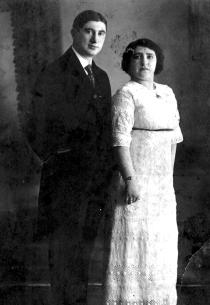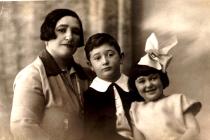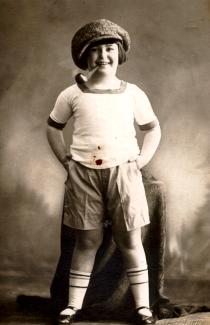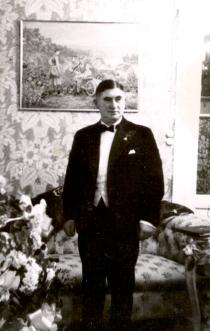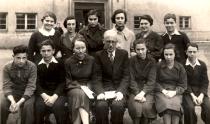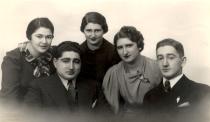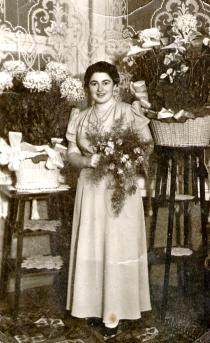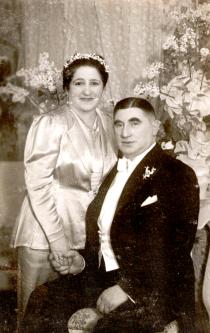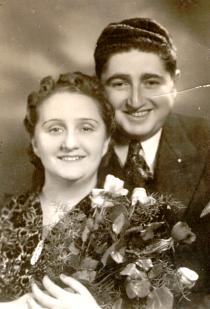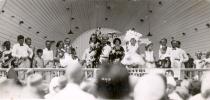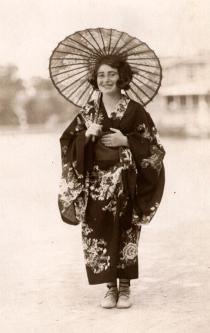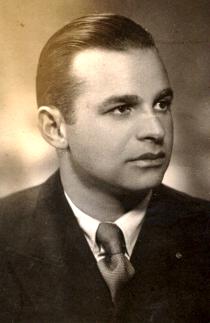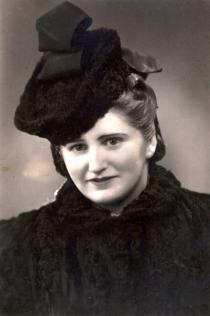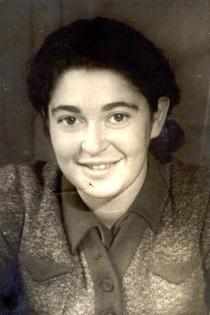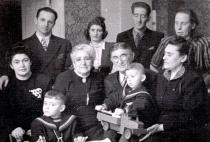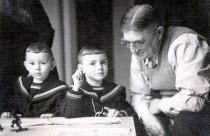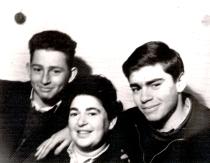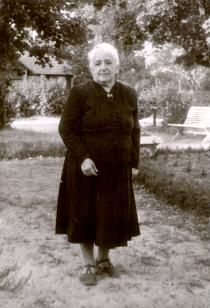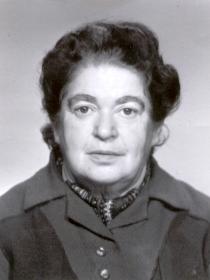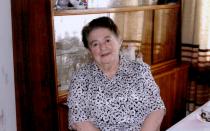
Liya Kaplan
Tallinn
Estonia
Interviewer: Ella Levitskaya
Date of interview: June 2005
Liya Kaplan lives in a two-room apartment in the center of Tallinn. The first thing you notice there is the abundance of books. Since her husband's death, Liya has lived by herself. She is a charming young-looking lady. Her auburn hair is secured in a French pleat, her lips are painted. Liya is a small lady on the heavy side. She can hardly walk, as her legs are hurting. That's why she rarely goes out. In spite of this, Liya is very active. And in spite of her feeling unwell, she supports three elderly ladies, visiting them once in a while, calling on the phone and checking whether they need anything. Adults and children come to Liya to study Ivrit. She is very amiable and affable. She has a pleasant smile. I found her story very interesting.
Family background
Growing up
During the War
After the War
Glossary:
I don't know much about father's family. Unfortunately I don't even remember what town my father's family came from. All I know is that my paternal grandparents were born in Estonia. I don't remember their first names either. Grandfather's last name was Berkovit?. Father told me about my grandfather, whom I had never met. He came from a large family and had many siblings. I think grandfather's family was rather poor. All the boys slept on a wooden bench.
Once, a soldier came in. He was drafting soldiers for Nikolai's army 1. The children were asleep and he grabbed one of them by the leg and pulled him from under the blanket. It was my grandfather. He became a Cantonist 2 and served in the tsarist army for 25 years, as was the term at that time. Only after his army service was over could a Cantonist think of a family. I don't know where Grandfather got settled after being through with the army service. He got married and learned to be a tailor.
Jewish families were large at that time and there were twelve children in Grandfather's family. Apart from my father Isaac, born on 16th April 1886, I knew only two of them: his brother Iosif and his sister Vikhne. The family was truly Jewish, which was customary for that time. Jewish traditions were kept: they went to the synagogue, observed the Sabbath and Jewish holidays at home. Yiddish was the mother tongue of my father and his siblings. The sons went to cheder. I think they got a secular education as well. My grandparents died long before I was born. I have never seen them, not even in a picture.
From his childhood my father helped my grandfather at work; it was from him that my father learned the profession of a tailor. My father said that before the outbreak of World War I he was drafted into the tsarist army. Even as a child, my father had an ear for music and he was admitted to the regiment orchestra. He played the trumpet and violin. Upon his return from the army, my father got married and my parents settled in Tallinn. Of course, they had a traditional Jewish wedding; it couldn't have been any other way.
My maternal grandparents were also born in Estonia, but I don't know exactly when and where. My mother never told me what her father did for a living. My grandmother was a housewife. I never met my grandfather, Samuel Tsipikov. He died in the 1900s. I knew my grandmother, Khana Tsipikov, very well and loved her very much.
I know that the family was very large, there were fourteen children. I knew only three of them, other than my mother: my mother's sister Rosa [cf. common name] 3, her Jewish name was Reizl, and her brothers, Leopold and Nisson. My mother Frieda was born in 1889. I don't know where she or her siblings were born. My mother's family was religious and all Jewish traditions were strictly followed. Yiddish was spoken at home. Everybody spoke good German as it was spoken by many people in Estonia.
All the children were taught all kinds of crafts. My mother was a milliner before getting married; she made very pretty hats. My mother's brother Leopold was a butcher. He was stocky and always merry. I loved him very much. He was single. I don't remember what profession my mother's second brother Nisson had. He was married and had children. I remember that they were indigent. My mother's sister Rosa married my father's brother Iosif Berkovit?. They had two sons: Samuel, named after my grandfather, born in 1924, and David, born in 1927.
I don't know how my parents met. I only remember from my mother's tales that my father had wooed her for a long time, but she hesitated for some reason. In the end, they got married.
After getting married both my parents worked. My mother made hats at home and my father was a tailor. They lived modestly, refusing themselves many things. With time they managed to save enough money to open a fabric store. They sold silk and woolen fabric. The store was in the downtown area, located in a thoroughfare and gradually it became prosperous. At first, my mother worked in the store as a cashier. Once the business took off, they hired workers and my mother became a housewife. My father didn't work in the store either, he hired sales assistants. The family was large and my mother had maids.
There were five children in the family. The eldest brother Samuel was named after my maternal grandfather. He was born on 4th April 1915. My elder sister Ida was born on 11th September 1916. My second sister Vera was born on 14th September 1918. Her Jewish name was Dveira. Rudolf was born on 9th November 1919. I, the youngest, was born in 1922. I was named Liya.
I don't know where my parents lived after getting married. When their store became profitable, my father purchased a house for our family. I was born in that house. It was a two-story wooden house in the center of Tallinn. The house was big. There were nine rooms and a large kitchen on the ground floor. There were rooms on the second floor as well. There was a huge, gorgeous orchard by the house. There were apple trees, plum trees, berry bushes and wonderful flowers. My father liked flowers a lot. He ordered buds of some special tulips in Holland. Those tulips grew in our garden. On 8th March 1944, there was a horrible bombing. Soviet aircrafts bombed Tallinn and our house burned down as a bomb fell right onto it.
Jews were not separate in Estonia; Jewish houses were mixed with Estonians. It depended on the income of the house as not everybody could afford to own a house in certain districts. The land was more expensive in the downtown area and much cheaper on the outskirts. We were friendly with our neighbors.
My maternal grandmother, Khana, lived with us for a while. Then she wanted to be on her own and my father, who loved and respected my grandmother, rented a small two-room apartment for her. I remember my grandmother had nice copper dishes in the kitchen. Her place was neat and tidy. I called on grandmother almost every day. I loved her very much, I liked to spend time with her. She knew a lot and was well-read. She always had time to listen to me and help me tackle my childish problems.
We mostly spoke Yiddish at home, sometimes German was generally accepted in Baltic countries. All of us knew Russian as well.
My parents were very religious. There were people who prayed in the synagogue twice a day, in the morning and in the evening, but this was not practiced in my family. We respected and observed all the other Jewish traditions. Friday evening we marked the Sabbath. My mother lit candles and prayed. Then we had a festive dinner.
Our house was known for tradition, which implied that anybody could come to us for the Sabbath dinner without invitation. Those who didn't have a place to have their Sabbath meal were hospitably invited to our house. Our relatives always came on Sabbath evening. There were also the visitors who didn't have a chance to get home in time for the Sabbath. We were happy to see everybody.
The next day it was a rule for parents to go to the synagogue. They took the children with them. We went to the synagogue on holidays as well. There was a large, beautiful synagogue in Tallinn 4; it doesn't exist anymore, it burned down during the bombing in 1944.
There were two cupboards in our kitchen: one for everyday dishes and another one for Passover, which was used only once a year, on Pesach. My mother strictly observed kashrut. There were separate dishes for milk and meat meals. There was no bread at home for the entire Pesach period. Matzah was bought in the synagogue and was eaten instead of bread. Matzah dishes were cooked. My father held the Pesach seder in accordance with the rite.
The family obligatorily fasted on Yom Kippur, starting from the first evening star on the eve of the holiday and continuing until the first evening star at the end of the next day. Children began fasting from the age of 12. Younger children could choose to miss one or two meals, but it wasn't obligatory. Sick people weren't allowed to fast. They had to pray without fasting so as not to harm their health.
The Kapparos ritual was observed in our family, though not with chicken, but with money. [Editor's note: Kapparos is a traditional animal sacrifice that takes place on the eve of Yom Kippur. Classically, it is performed by moving a live chicken around one's head three times, symbolically transferring one's sins to the chicken. The chicken is then slaughtered and donated to the poor, preferably eaten at the pre-Yom Kippur meal. In modern times, most communities perform it with charity money substituted for the chicken, swung over one's head in a similar fashion and then donated to charity.] Money was given to the synagogue as a donation for poor families for them to have a chance to celebrate Pesach in accordance with the rules. We always went to my grandfather on Rosh Hashanah and on Pesach. His place looked neat, beautiful and ceremonious. We also celebrated Purim and Chanukkah.
There were kosher stores in Tallinn. My father's sister Vikhne Ivanovskaya and her husband owned a kosher store. They sold kosher meat and chicken. They also made very delicious kosher sausages. Vikhne was a great cook; she baked very tasty Jewish cookies, honey cake and keiglach, rolls cooked in honey.
Jews in Estonia felt free. Anti-Semitism was not free. In the period of the First Estonian Republic 5 Jews obtained cultural autonomy 6 according to the government resolution. There were Jewish stores, Jewish schools and Jewish organizations. All boys who reached the age of thirteen were to go through their bar mitzvah. There was a Judaic department in Tartu University. Jews were free to enter any institutions of higher education except for military schools, where there was no admissions quota 7.
The Jewish community of Tallinn was wealthy. Of course, there were poor families, but most people lived comfortably. Jews owned houses, stores and shops. There were a lot of representatives of Jewish intelligentsia: doctors, teachers and lawyers. In general, people made a good living, nobody starved. The community helped the poor.
There was a Jewish canteen in Tallinn, funded by the Gleizer family. Not only Jews came there to eat Jewish food, but many other people came too. There were a lot of dishes on the menu, to satisfy any taste. There was a Jewish club on Karia Street, called Byalik's club 8. There was Jewish cuisine there as well. In the evenings people got together there, had dinner, played cards and pool. All kinds of get-togethers and family reunions were arranged there.
My mother was involved in charity work. She was the chairman of the ladies Zionist organization WIZO 9. My mother helped poor Jews a lot. Every day students from poor families came to our home for lunch. One boy, whose parents were divorced, lived with us for a year as he was lonely. My mother lead a group of women who visited the poor, gave them food and presents, and tried to support them the best they could. WIZO ladies collected clothing and footwear from rich families and then distributed them to poor people. There was a buffet in our Jewish school 10 where rolls, sandwiches, coffee, tea and stewed fruit were sold. Every day during recess, WIZO ladies served children from the buffet. My mother was also behind the counter. Apart from that, WIZO ladies baked rolls and cakes for children and handed them out for free. My mother knew all the students from the poor families in the school and always took care of them. She was also a member of the school's parents' association. My father donated furniture and curtains.
There were two Jewish schools in Tallinn, both in the same building. There were only private Jewish schools, there were no state ones. In one school, classes were in Ivrit and in the other one they were in Yiddish. Children from poor families studied there as well, on the charity programs. Such students were maintained by rich Jews. Students of both schools were on friendly terms, but we, the students of the Ivrit school always found a way to say that we were the true Jews, and they were Yiddishists 11.
Most children didn't know Ivrit. That's why there was a kindergarten in the Ivrit school, which was attended by children at the age of six, one year before school. I also went to that kindergarten. At the age of seven I entered the Ivrit school, where my elder siblings went. Apart from Ivrit, we studied German, French and English. The school was secular, but we studied religion, history and Jewish tradition.
There was a great chazzan, Gurevich, from the Tallinn synagogue, who taught music at our school. His son was the famous Estonian conductor Eri Klas. A handsome man, Gurevich had a wonderful voice. He played a small harmonica to which we sang. The director of our school, Gurin, came from Romania. The mathematics teacher, Bronimov, and the geography teacher, Kosotskiv, were from Poland. They had an excellent command of Ivrit. My distant relative Motle Zhitomirskiy taught Ivrit in junior grade. He came from a very religious family. I was friends with Evgeniya Gurina, the headmaster's daughter. We had been friends since kindergarten.
There were wonderful Jewish festivals in school. Children gave concerts; parents were invited and they were very grateful. My mother and the WIZO ladies always baked cookies and cakes for the festivals. They were sold dirt cheap in the buffet. There was also a charity auction. Rich people donated something precious: a crystal vase, golden ring or a necklace for the auction. The bid prices were higher than usual. The money from the auction and the baked goods were distributed to the poor. Those who were leaving for Palestine were given money as well.
We were members of youth Zionist organizations at school. I was a member of Hashomer Hatzair 12, my friend joined Betar 13. There was no animosity among us.
My mother always took me to the synagogue with her. Of course, I didn't know all the prayers by heart, but I knew how to read Ivrit. My mother told me which prayers to read; she and I were on the second floor, in the women's section, and my father was on the first, where the men prayed. There was a magnificent choir in the synagogue, consisting of Jewish men and boys. Cantor Gurevich was the principal. The singing was beautiful as they had wonderful voices. During intervals between prayers little kids were allowed to go downstairs, so I went to my father. There was a festive meal in the synagogue during holidays. Ladies baked delicious sponge cakes, which were shared with everybody.
Having finished at the Jewish high school both of my elder brothers entered the economics department at Tartu University. My brother Rudolf was born crippled. During birth his right hand was damaged by obstetrical forceps and it remained mutilated. Rudolf was not in despair though. He learned how to write with his left hand and was good at drawing. He was intelligent and charming and everybody who spent time with him soon forgot that he was disabled.
My sister Ida was afflicted with pneumonia in 1939. There were no antibiotics at the time and they didn't know how to treat the disease, so. she died within a couple of days. Ida was buried in the Jewish cemetery in Tallinn in accordance with Jewish rites. My sister Vera had a very good ear for music. After school she entered the grand piano department at Tallinn conservatoire.
Jews and Estonians were very friendly towards each other. In 1936 my father celebrated his 50th birthday. There were a lot of guests, including his business partners, Estonian entrepreneurs. They didn't find it shameful to come over to a Jew and congratulate him on his birthday.
When in 1933 Hitler came to power in Germany 14, the spirit of hatred towards Jews started penetrating Estonia. All of us felt the anti-Semitism. At that time we didn't understand the scale of it. There were short articles in the press, without details and comments. We learned about those events from the radio and papers, but no details were provided. We had wirelesses and could listen to any radio station of the world. Thus, we found out about the atrocities the fascists in Germany were committing and about the concentration camps.
Then fugitives from Germany showed up. There weren't very many of them. It must have been hard to escape. Once, somebody rang on the door and I opened it. There was a Jewish fugitive on the threshold. Half of his beard was torn. My mother let him in and gave him food and clothes. Then he was taken care of by the Jewish community.
We should all have understood that no good should be expected from Germans, but unfortunately, most Jews didn't take it seriously. At that time, Estonian fascist organizations were founded. It was during this period that for the first time in my life I heard someone say, 'Bloody Jews.' Nobody had ever said anything like that before. We didn't bother anybody in Estonia.
In about 1938 discrimination of Jews started; it was not that conspicuous, but it was still there. I remember I called my grandmother every day and brought her papers in Yiddish, which Father was subscribed to. My grandmother perused them and when she saw Hitler's picture in the paper, she hit it and said, 'Die, die!' My grandmother died in the late 1930s. She was buried in the Jewish cemetery in Tallinn.
In 1939, the Molotov-Ribbentrop pact 15 was signed and the first Soviet military bases were established 16. Soviet troops came. They acted neutrally, not very confidently. I remember a funny case: a Soviet soldier came to the grocery store and asked gingerly whether he could buy 200 grams of sausages. 'Yes, please,' said the sales assistant. Then in two or three hours he came back again and asked for another 200 grams of sausages. He came in the store several more times and bought some more sausages. Finally, the astonished sales-assistant asked why he wouldn't buy as much as he needs in one go, and he asked, 'Can I?' At that time we didn't know that there were rations in the food stores, we weren't aware that there might be no goods in the stores. We knew nothing about Soviet life. Soviet soldiers couldn't believe they could just walk into a store and buy anything they liked.
There were some distant relatives of my mother in Leningrad, but after the revolution in Russia 17 we no longer kept in touch with them 18. Correspondence with relatives abroad was not encouraged in the USSR, Soviet citizens who were found to be doing that might be arrested or sent to a Gulag 19. That's why we just knew that they were there, and that was it.
Once a sailor came and said that he was a relative of ours, Elya Berkinov. He came to see us and brought friends with him: first a Jew named Mikhail Levin and then another friend. Soviet soldiers and marines, Jews often came to us. My friends also came over for a chat. Most of my friends spoke Russian; we spoke Yiddish with the soldiers. After 1940, some of my friends even married some soldiers, who they had met in our house. Then in 1939 Elya came and said that they weren't permitted to call on us as we were bourgeois, capitalists. So that put an end to the visits.
In 1940, the communists came to power with the help of Soviet troops. There were demonstrations of the workers, accompanied by Soviet tanks. The government resigned and the parliament was dissolved and preterm elections were announced. The communists won the elections by a majority vote. The Estonian Soviet Republic was established right away and Soviet Estonia officially became one of the Soviet republics. That was how all the Baltic countries were occupied 20.
When a number of people came to Estonia from the USSR, anti-Semitism became more common, mostly due to the newcomers. It seems to me that anti-Semitism was always present in Russia and was natural for citizens of the USSR. They were the ones who brought it into our country.
We immediately felt that a new regime had come to power. Somebody rang on our door and a Soviet colonel came in carrying a bed. He said that the municipal authorities had told him to take one room in our house. My parents gave him the largest room and he moved in there. After a while another soldier came and told us to vacate our apartment within two days. Our house was nationalized; it was needed by the Soviet regime, who decided to make a hospital there. We, the former bourgeois, had to leave there at once. My father found a small house in a beautiful suburb of Tallinn, called N?mme, so we moved there.
Of course, my parents were not delighted by the new regime, like most Estonian people. Only the communists, who were in the underground during the Estonian republic, were rejoicing as they wanted the Soviet regime. Our standards of living were pretty good before the Soviets came. Those who were working earned enough for a comfortable living. It was definitely hard to find a good job, but it was possible if a person wanted work and had skills. Food was cheap. Even if there weren't enough delicacies, there was potato, sprat and bread in every house. So, people wouldn't starve to death.
My father's store was confiscated. He was a kind man and treated his employees very well; he was loved by everybody. When my father was told to give the keys of the store to a commissar 21 who had been assigned to run the store, all the workers started to talk the commissar into letting my father stay, but my father wasn't willing to. It was the end of our trouble.
When we were still in our house, one man came and told Father to pay a huge tax to the state. I don't remember the exact amount. When my father asked why he was supposed to pay, since his store had been taken, the man just told him not to ask silly questions and give the money. My mother gave him her jewelry and he left. In two weeks he showed up again and named a new sum for the tax. My mother gave away her diamond rings. When he came for the third time we were in Nomme. He said that we were supposed to give the state all our precious belongings, table silverware and so on. My mother gave him everything and my parents were nervously awaiting another visit. They packed a suitcase and when a car passed by our house, we feared that it was the NKVD 22 coming after us.
The 14th of June 1941 was a dreadful day, remembered in Estonian history as the day of deportation 23. It was the day when the Soviet regime exiled over 10,000 Estonian citizens to Siberia. There were Jews among them, but most of those exiled were Estonians. The majority of those exiled were political activists and soldiers of the Estonian army. They were arrested before, but exiled on that day. Intelligentsia and wealthy people were also exiled. There were people who were exiled by accident. It must have been the case that some people were included in the list simply because they were disliked.
My mother's brother Nisson Tsipikov and his family were also exiled, though they were poor people. My uncle was in the Gulag. Every day they had to walk to the work site, 20 kilometers from the camp. My uncle was involved in timbering, he cut trees. He had never done anything like this before, and he barely survived there. His teeth fell out and he became unable to do any work. By a miracle, Nisson was exempt from the camp due to poor health. He didn't live long though; he died in the 1950s. His wife died in exile as well.
We felt lucky and surprised at the same time not to have been included in the list of those exiled. I don't know how we managed to stay safe. I guess, another stage of exile might have been planned, if Germany hadn't attacked the USSR. The war was unleashed. It was called the Great Patriotic War 24 in the Soviet Union.
I met my husband-to-be Marcus Kaplan in the last but one grade at school. I went to see my relatives in Tartu. Whilst there I met a Jewish girl named Berta, who had graduated from the Estonian Philology Department of Tartu University and taught Estonian at Tartu Jewish school. Berta and I had a frank conversation and it wasn't long before we both felt like we had been friends for ages. Berta suggested showing me Tartu. On our way we called on her brother Marcus, who owned a small store downtown. Berta introduced me to him and said that we were on the way to a café and asked if he'd join us, if he'd like to. Berta and I went to a café and after a couple of minutes Marcus came in. We spent some time together and then Berta tactfully left, leaving Marcus and I to spend the whole day together.
We started seeing each other after that. Marcus came to Tallinn, and I made trips to Tartu. Both of my parents liked Marcus and things were evolving, so I was to marry him after leaving school. Marcus was born in Tartu in 1912. His parents were no longer alive. His sister Berta and brother Abram lived in Tartu. His other brother and sister lived in Kazan, in the USSR. They left there before the revolution to study, but then they couldn't come back.
In 1941, Jewish schools were closed down in Estonia by the new regime. Our Jewish school was turned into secondary school. Our 12th grade was left and we finished our studies in early June 1941. The war was unleashed in two weeks.
Unfortunately people are not always wise; people can be so stupid and selfish that they don't want to leave their belongings, and instead they hope for the best without thinking about saving their lives. This could easily have happened to us as well. We were on the verge of staying in Estonia, but fortunately my elder brother Samuel insisted on our evacuation. We left on 9th July 1941.
Samuel was called-up and was to be on the frontline within two days. Shortly before war broke out, he married his classmate Sarah Katsev. They had been in love since childhood, either from fifth or sixth grade. Unfortunately they weren't able to live together for a long time. Sarah came to see us off. I begged her to leave with us, but she refused. Her mother was dying of cancer and Sarah couldn't leave her. Besides, Samuel had already been mobilized and Sarah was afraid that Samuel wouldn't be able to find her if she was evacuated. Sarah's married sister Mary Lurie stayed with her son Hersh as well. Mary was a surgeon.
Later, when we came back from evacuation, the warden of the Jewish cemetery told us that they had all been taken during the night to the concentration camp Harku 25. A couple of nights later, two Estonian men brought the corpses of Mary Lurie and little Hersh to the cemetery. Mary couldn't stand the ordeal of the concentration camp and couldn't bear to see the execution of her little son, so she poisoned him and cut her veins. Those wonderful Estonian guys brought their bodies to the Jewish cemetery and asked for them to be buried in accordance with Jewish law. The warden did as she asked, though according to Jewish law, those who commit suicide are not meant to be buried in a Jewish cemetery. But if you think deeper, Mary and her son were murdered by the fascists.
Sarah and her mother were also killed in the Harku concentration camp. My brother Samuel was killed on 10th January 1943 in the battle in the vicinity of Velikiye Luki [a city on the Lovat River in the southern part of Pskov Oblast, Russia]. My mother's brother Leopold didn't want to get evacuated and stayed in Tallinn. He didn't think the Germans would be any worse than the Russians. He died when the Germans occupied Estonia.
On 9th July Samuel came to us. Each of us took a backpack, my brother hired a cab and we went to the station. The five of us went: my parents, my brother Rudolf, my sister Vera and I. David Berkovit?, the son of my father's younger brother Iosif Berkovit?, and Mother's sister Rosa joined us at the station. Their eldest son Samuel went into the army as a volunteer. In 1944 Samuel perished in the battles under Narva. David was 14 in 1941. He was a very gifted boy; he played the violin. He was the student of a great teacher at the Tallinn conservatoire. David took the train with us, but a military convoy took him from the car. He was told that he was an adult and was supposed to dig antitank trenches with the others. David stayed in Tallinn and perished during the occupation. His parents weren't going to leave. They stayed in Tallinn and died in the concentration camp.
We were lucky to get a passenger train; our trip was comfortable. There were trains with open carriages, full of evacuees. We saw a train coming from Riga, where a lady stood on the open carriage with an infant in her hands. It was horrible. The train set off, the pace was slow. We had to let the trains going to the front go first. When we were approaching the bridge across Narva, an air raid started. Our train was being bombed, but antiaircraft weapons which were on the bank, were aiming at the planes. The train was crossing the bridge and I was trembling with fear thinking that the bridge would be crushed and the train would fall into the river. For many years after war I had a recurring dream: the train was going along the bridge and we didn't know whether we made it or not.
We passed the bridge and had the first stop at Mga station. It was burned after a bombing and I heard cries, the lamentations of scattering people. I remember people rushed to the station trying to look for a place where bread was being handed out. It was a brief stop and the train started off pretty soon. It was a long and tiring trip and finally we reached Arsk station, in Tatarstan [1000 km east of Moscow].
All those who were evacuated were split up in kolkhozes 26. We took the cart and went to a kolkhoz in the village of Surda. We settled in a small house belonging to a Tartar lady. There was one room, where a huge oven took most of the space. Apart from the five of us, the hostess, a nanny- goat, a chicken and lots of fleas lived in that room.
Although I was not as accomplished as my sister Vera, I too was rather musical. When I went to school, I dreamed that I had a small Italian accordion. I considered it to be a luxury. Besides, I was a proud girl and didn't want to ask my father for money to buy one. I gave classes to younger kids at school and was paid for that. I didn't squander money on anything and eventually saved enough to buy an accordion.
Of course, it was the most precious thing I owned and when we left for evacuation, I took it with me. Owing to that we managed to scrape along. My sister Vera, a singer called Arder and a fiddler called Leivald organized a small band. Arder sang, Leivald played the violin and Vera played the accordion. They went from one village to another giving concerts. Local residents paid them with products: peas, a loaf of bread and some potatoes. The winter was coming, and we had neither warm footwear nor clothes.
I was really worried about Marcus and his family. I didn't know if they had managed to leave Tartu. There was no news from them. The only thing I knew was that his siblings lived in Kazan. My father and I decided to go there to find out about Marcus. We took some things with us to sell and get tickets. It was really amazing for us to get the ticket to Kazan. We had been looking for Marcus's relatives all day long, but to no avail. We came back to the station, and stopped on the platform by the train. Suddenly a man jumped out of the train and took my hand. It was Marcus! He had come to Kazan with his sister to look for his relatives. It turned out that they were in evacuation not far from us, in Chuvashiya, but we bumped into each other in Russia.
Marcus went to the village with us. He had stayed there for a day and left. He said we had a week to think about what we'd do next. We had to leave for Central Asia or somewhere else so as not to die of cold in the winter. It was decided that my family would stay in Surda, but Marcus and I would try to find a place to live and work.
A week later, Marcus met me at Arsk station with his sister Berta and brother Abram. There were a lot of people and we were really lucky to be able to take one train. We reached Alma-Aty, but failed to find a job there. We took another train, leaving for Kirghizia [Kyrgyzstan]. Evacuees were met there by kolkhoz people on carts with high wheels, harnessed to camels. We were taken to a kolkhoz named after Kaganovich 27 in Djalabad region. The four of us were given lodgings in a small clay house. We stayed there for a couple of months and worked on the kolkhoz.
On 27th February 1942 my future husband and his brother Abram were mobilized in the Estonian corps of the Soviet army 28. Early in the morning Marcus and I walked to the regional center and got our marriage registered at the local regional council at 8am. At 9am my husband was at the collection point and was to join the front line. We didn't see each other for three and a half years. We only started our life together when he came back from the front.
We stayed in Kirghizia. I invited my parents and Rudolf. Vera left for Yaroslavl. The Estonian government and ministry of culture 29 were evacuated to there. Temporary accommodation was given there to artists, singers and musicians by the Estonian government. All the participants of our musical band were invited to Yaroslavl. My parents came to stay with me in Kyrgyz. I lived with my parents, my brother and Berta and Marcus' sister before our return to Estonia.
Berta and I worked in the cotton fields. It was a hard work and, being used to the cold Baltic climate, we couldn't stand the heat. It was 40° Celcius all year round. My parents were sick as it was even harder for them to bear the heat. They couldn't work because of it. Every day both of us got one scone made of flour and water, which was to feed my parents and brother as well. The kolkhoz didn't provide anything for them. I sold my watch and bought some flour with that money so that my parents and brother would have some food for a while. Then Berta sold her watch as well.
We were given a small plot of land where we planted some corn. We harvested it and ate corn every day. Since that time I loathe even the word 'corn.' Luckily when I learned how to speak the languages Kazakh, Kyrgyz and Uzbek pretty well, I was given some work to do in the kolkhoz office. Whilst working there, I was given a daily ration of 200 grams of flour and a little bit of butter. Life was easier on us. There were a lot of melons and we ate them often.
We took water from an aryk [artificial irrigation canal]. There was a small aryk by our house. The water came from the Tien Shan mountains via the Fergana valley to our canal. It looked dirty. We drank water from that aryk along with camels and donkeys. We took water at night, when the sediment went down. We filtered it through gauze sheets, boiled it and only after that we used it for drinking. It was a long process to get it ready, but we had to have water for cooking and bathing.
There was no medicine on the settlement. Women gave birth to children in the open, in the fields. It was hard to maintain hygiene. Firstly, everybody was lice-ridden. We had to cut our hair to get rid of the lice. The locals were very religious Muslims. In accordance with Islamic law, you can't kill even a louse as it was created by God, and by killing anything created by God you insult him. The local population treated us very well and people tried to help us out as best they could, though they were terribly indigent.
I remember once at night we woke up from cries and noise. It turned out that exiled Chechens 30 were being brought into the settlement. There were 200 people. It was scary to look at them, they were so gaunt. Their children's bellies were swollen from dystrophy. Almost all of them died, first the children, then the adults. It was horrible. There was nothing we could do.
I received a letter from my friends, saying that my cousin Haim Karshenstein, the son of my father's sister Vikhne Ivanovskaya, was living in exile not far from us. We sold a couple of our things and I sent him some money via my friends. Haim wrote me a letter saying that thanks to the money I sent he bought some garlic and it saved him from beriberi [a disease of the nervous system caused by a lack of vitamin B1 in the diet].
I corresponded with my husband. He was in the Estonian corps. He became a medical orderly. He finished the front line courses for giving first aid. Marcus was always on the leading edge, taking the wounded from the battlefield. He won awards. After the war some people whom he took from a fire during the war, came up to him in the street. They thanked him for saving their lives.
In 1944 we found out that Estonia was liberated from the Germans, but we didn't manage to return home until July 1945. We were supposed to get the permit for re-evacuation in the re-evacuation department of the Council of Ministers of Estonia.
During the war there were a lot of concentration camps in Estonia. There was the notorious Klooga camp in Tallinn 31, by Harku Lake. My husband told me that when the Estonian corps was liberating Estonia, they came to Klooga and saw burning fires made of layers of corpses and logs. They came too late.
Many of our distant and close relatives, about one hundred in total, who remained in Estonia, were exterminated. They each stayed for different reasons: some of them were sick, others thought that they were too old to move, others truly didn't believe that the Germans would murder Jews. I knew that Estonians supported the fascists, but I thought it was because they hated the Soviet regime. Their loved ones were exiled in Siberia, their property was taken, and they were banished to the streets. How could they have loved the Soviet regime? Of course, they thought that the Germans would liberate them from Soviet oppression. Germans treated Estonians pretty well. Communists were definitely persecuted during the German occupation, but common people were treated loyally.
But still, I think that the Holocaust cannot be compared to living in exile. I understand that the latter was terrible, that many people died there as well, but still the difference between exile and the Holocaust is enormous. Jews in concentration camps were leaving on their last trip to the crematorium, holding a small child. They were to face death and they were aware of it. There was no chance for them to be saved. In exile there were inhuman conditions: people died from emaciation and overwork, but still many of them survived. No matter how it might sound, exile turned out to save them.
My sister Vera came back from evacuation with the ministry of culture earlier than we did. She worked for the ministry of culture as secretary to the minister. There was a poky room, about five square meters at the ministry, and all of us lived there for about a month. Former workers from my father's store helped us a lot. Hugo Kleimeyer worked for my father before his property was confiscated. When we came back from evacuation in 1945, he was the Estonian Trade Minister. Once he met my father in the street, recognized him and told him to call on him whenever his assistance was needed.
At that time there was a great deficit and there were hardly any goods in the stores; the lines were huge. Upon our return, we didn't have anything. Kleimeyer helped all of us. When we could no longer stay at the ministry of culture, one of my father's former employees let us lodge in her place for three months. She gave us food and clothes. This was how my father was treated by his former employees. This says a lot about my dad.
Finally we moved to the house in Nomme, where we had lived before evacuation. It was dilapidated. Germans had stayed there leaving it filthy and falling apart. It was hard to bring things back to order. The house was empty. There were none of our things left. There was neither a bed, nor linen, nor a spoon. There wasn't anything. We had to buy all the basics. When we were evacuated, we took hardly anything with us, leaving everything at home. The neighbors, Estonians, told us that some people had ransacked our house with torches at night.
Food cards were introduced 32, but there was very little bread. My school friend worked in the re-evacuation department of the Council of Ministers of Estonia. She offered me a job there when we came back home. I worked there for seven years and the department was reorganized into a repatriation department. Many Estonians were forced to leave the country for Germany or Austria. They were only able to return if they had a permit from our department. We took care of different things, even distributing clothes, sent by American Jews. My husband was still in the army. When I started working for the re-evacuation department, life became easier. We were given food rations which came in very handy.
My brother Rudolf returned to his previous job upon his return to Tallinn. He worked for a shoe factory, and soon became head of a department. Rudolf assembled a unique archive on tanning and leather manufacturing. My brother collected postcards with copies of famous paintings. He had a huge collection. Rudolf was single, he lived with our parents. He was always weak, and died in 1994. Vera was also single. She died in 1992. They were buried in the Jewish cemetery in Tallinn.
Having been demobilized Marcus finished medical school and found a job as an assistant to the doctor at the sanitation station. Marcus did well at work. He was appreciated at work and sent to refresher courses. He worked there until the last days of his life.
My husband was still in the army when the war ended. His unit was disbanded in Tallinn and he came home to spend the night. Our first son was born in 1946. When we were in Kirghizia I saw a pomegranate tree in bloom. It was so beautiful: orange and ruby-red flowers like little roses. In Ivrit, the pomegranate is called a Rimon. I made up my mind, if I had a son, I would call him Rimon, or if I had a daughter, Rimona. So I gave birth to a son and called him Rimon. My second son was born in 1948. My husband wanted to name him Movsha after my husband's father. In Ivrit Avi means 'my father,' and I called my second son Avi.
Both of my sons were circumcised. It was mandatory and natural for my husband and I. There was no synagogue in Tallinn at that time. It burned down in 1944. There was a smaller place, a prayer house. The circumcisions were made at our place. We invited a surgeon who did things the way they were supposed to be done.
We kept on observing Jewish traditions at home. Of course, it was hard to do that, but we did our best. Matzah was not sold there. There was no place to buy candles for Chanukkah, and there was no chanukkiyah. We managed somehow. We taught our sons the Jewish traditions, the history of the Jewish people. Our sons knew all about the Jewish holidays and the purpose of each of them. We were not ashamed of being Jews and didn't try to hide it. We also marked Soviet holidays: 1st May, 7th November 33. They were just additional days off at home. Only the Victory Day, 9th May 34 was a true holiday for us.
After evacuation we lived in Soviet Estonia, in the Soviet Union. It was strange and unclear to us: totally different laws, customs and way of life. We couldn't correspond with our relatives aboard. Such people became 'peoples' enemies' right away 35. We weren't allowed to speak Ivrit as we could be blamed for being Zionists or even imprisoned. My husband and his relatives spoke Yiddish mostly, but at work and at school we had to speak Russian. My sons know Yiddish, but they mostly speak Estonian. We couldn't even think of teaching Ivrit, not even Yiddish. We couldn't have dreamed of having Jewish schools.
Though the USSR was called the state of all people who resided there, the regime was intolerant of those who wanted to speak their mother tongue. If a person lived in the USSR and didn't want to speak Russian, he was considered a peoples' enemy. There was a struggle against religion 36, any kind of religion, not only Judaism. People couldn't even tell their friends that they were thinking of leaving for Israel. I knew one person who was imprisoned just for considering leaving for Israel. He stayed in prison for ten years and finally he got a permit for departure. When he left, he wasn't allowed to take any of his things.
I knew that I should get an education. There was a course to become a technical information expert at the Tallinn Polytechnic Institute. I finished that course. I left the repatriation department and worked as a technician at the design institute Esgiproselkhozstroy for a short period of time. Then I went to work for the design bureau of furniture and the wood processing industry as a director of the engineering library. I put in a lot of effort for our library to become the best.
Then I was assigned as head of the information department. I was fluent in Estonian, Russian and German, and had basic knowledge of English. I worked with foreign manuals, searching for materials for furniture manufacturing, lacquer materials and patents for our designers. I translated those materials into Russian from Estonian, German and English. We were subscribed to 120 journals. I was supposed to browse all of them and find the necessary information there. I loved my job and found it interesting. I worked in the design bureau until I retired.
In 1948 the cosmopolitan campaigns began in the USSR 37. They were against Jewish scientists, actors and writers. This happened in Estonia as well. Soviet laws were equally enforced in the entire Soviet Union. This was when a wonderful Jewish actor, Solomon Mikhoels 38 was assassinated. People treated him differently. Cleverer people understood what was going on and what to believe, others trusted things written in the papers and assumed they were true.
Then the Doctors' Plot began 39. My husband was a medical worker and he was afraid that he would be fired. Fortunately his director was a decent man and told my husband, 'Kaplan, don't worry, you have nothing to fear while I am your boss.' At that time I worked as a technician in the design institute Esgiproselkhozstroy. My director, the architect Kesper called me into his office and told me that I shouldn't be afraid of losing my job while he was the boss. There were other people who wanted to get rid of Jews and fired them groundlessly. It has always happened.
The local population disapproved of many actions of the Soviet regime, and was against it in general, but there were no organized attacks. People were too scared that they would fail because any force would seem insignificant in comparison to the Soviet army. Of course some Estonians welcomed the Soviet regime. They were communists. There were a lot of go-getters, who joined the communist part only in order to advance their career. They understood that they would benefit from being a member of the party. They didn't even know to what extent they believed in the party's philosophy.
Stalin died in March 1953. There was no sense of grief, but all of us were very scared. We were afraid of uncertainty. We thought that an even worse tyrant would take his place. Beriya 40 became the successor of Stalin and we were horrified. Beriya was feared even when Stalin was alive. Then there was the twentieth communist party congress 41, where Khrushchev 42 held the speech exposing Stalin's personality. All of us understood that nothing would change for the better while the Soviet Union existed. We couldn't hope for normal life.
My mother died on 10th February 1966. My father survived her by two years. He passed away on 18th February 1968. They were buried in the Jewish cemetery in Tallinn. Their tombs are next to each other. They were buried in accordance with Jewish tradition. It's strange that the Jewish cemetery in Tallinn wasn't destroyed during occupation and the Soviet times, none of the graves were desecrated by the fascists, nor any of the tombstones demolished. That cemetery is still there.
In the 1970s mass immigration of Jews to Israel started in the USSR. Of course, it was easier here than in any other parts of the USSR. People were supposed to get the recommendation approved by the general meeting of employees. I know that such types of meetings in the USSR were turned into mere trials, where those applying to immigrate were called traitors. In Estonia everything depended on the person in charge. It was hard to get the permission from Russian directors, but the Estonians supported and helped. Our whole family was willing to immigrate to Israel. My husband had two heart attacks before that. He had the third attack before leaving and we couldn't even think of immigration. His doctors flatly banned him from moving to a different climate.
My sons went to an Estonian school. Having finished school my elder son, Rimon, went to Construction College in Tallinn, the department of metal processing. He was given a mandatory job assignment 43 in a jewelry plant in Tallinn. He worked there for 30 years. My son has good hands and a good head. He managed to work on seven machines. Rimon was eventually in charge of the workshop. The plant was purchased after the 1990s during Estonian Independence 44. Half of the employees, including my son, were fired. Since then my son has done odd jobs. He's 58 and it's pretty hard for him to find a good job.
His wife has been a child-minder in a kindergarten for a long time. My son's wife Mariana is half-Jewish: her mother is a Jew and her father is Estonian [according to Jewish Law, a person is considered Jewish as long as at least their mother is Jewish]. I was troubled that my son married a non- Jew, but nothing could be done about that. The most important thing was that they loved each other. They have a daughter, Khana, born in 1983. Having finished school she entered the architecture and construction department of Tallinn Polytechnic University. She does well. Khana will obtain a diploma in engineering.
My younger son Avi has been interested in cars since childhood. His toys were just a selection of cars of different sizes. He put his favorite cars under his pillow before going to sleep. He never stopped liking cars. Now he's the director of the automobile school. Avi has been married twice. His first wife, Galina, was a Jew, and together they had a daughter, Sorena. She was named after his wife's aunt Sore. They got divorced after a while and Avi got married again. His second wife is Estonian. They have a happy life together. I took his second marriage as a tragedy. We had such a Jewish family, with such a Jewish spirit and it was hard for me to get over my son's choice.
My sons identify themselves as Jews and I thank God for that. Both of them live in Mordu, a small town about 80 kilometers from Tallinn. Both sons and their families come to us on all the Jewish holidays. My sons are very close to me, they love and respect me. They help support me with anything I need, and call me and come to visit.
My husband died in 1988. He was buried in the Jewish cemetery in Tallinn according to Jewish tradition. My sons recited the Kaddish over his grave. Every year on the anniversary of his death they come to Tallinn and go to the cemetery with me. I have lived by myself since my husband's death.
When the General Secretary of the Communist Party, Mikhail Gorbachev 45, declared perestroika 46, I took it skeptically. Then I felt more optimistic when I saw quick changes happen in my country. We obtained the freedoms we had been bereft of since 1917, namely freedom of speech, meetings, demonstrations, press and religion. We really felt that our lives were changing for the better. The Iron Curtain 47, having severed us from the rest of the world for over 70 years, wasn't there any more. It became possible to correspond with people who live in other countries, go abroad, invite relatives and friends from overseas.
Since childhood I have dreamed of visiting Israel. It became possible during perestroika, but I couldn't afford it. Now I can't go there for another reason: my legs hurt and I can barely walk. Thus, this dream has remained unrealized.
The Jewish community of Estonia 48 was one of the first Jewish communities officially founded in the Soviet republics. We had high expectations from Gorbachev and it was sad for us to observe the downfall during perestroika. Things gradually reverted to how they were in the past. Even in my most audacious dreams I would never have imagined the collapse of the Soviet Union. It's the miracle of all miracles!
When the putsch started in 1991 49, we were glued to our TV sets and followed the news blow by blow. There were tanks in Moscow. People were shot and killed. Nobody knew the outcome and dreaded to think what would happen next. It ended in the breakup of the USSR. My first reaction to that was boundless surprise. I needed time to get used to the thought that it had really happened. Now we see that it was real. It's good that it happened. Every country should be free, allowed its own political views. The most important thing is to tune the economy. That's why any state should strategically count on its neighbors and the global economy not to go down. It's the most important thing. Estonia succeeds in that.
Of course, it's harder from a material standpoint. Pensions are skimpy and prices are going up. We were promised our pensions would be increased, but if pensions were raised, prices would be increased as well. It's one and the same thing. We're aware that we are living in hard times and our government does its best. Recently I got to know a pleasant piece of news from my community. Our parliament adopted a resolution to increase pensions for those who had been evacuated, as they would be considered having suffered in Stalin's time. I've already submitted all the necessary documents.
When I retired, I started working for the Jewish community. I liked the job as I knew I was helping people. The ladies Jewish organization WIZO 50 regained its work in Estonia. WIZO ladies work as volunteers. I and other WIZO volunteers call on elderly people and collect information: what kind of help is needed, medical or psychological. We fill in the forms for all of them. They were processed in the community and the data was computerized. Volunteers work in accordance with the information provided on the forms. There are thirty people working in WIZO and many of them are volunteers. We help people the best way we can.
Now I have trouble with my legs. I have pain in my knees and have to walk with a cane. I was offered to be operated on, but I'm afraid as I'm old. Besides, there would be nobody to take care of me as I wouldn't be able to move for two to three months. I can't work a lot in WIZO due to my illness. Now I take care of three elderly ladies, whom I call on the phone and visit. WIZO has monthly meetings. Unfortunately we have problems with finance. WIZO is not funded and we have no sponsors. We buy food for the holidays and small presents using our small membership fees. If somebody supported WIZO, we would do more for those we're helping.
Our community provides considerable assistance to people who are leaving for Israel. None of us help those Jews who are immigrating to Germany. I personally despise such people and don't understand those who just think of their welfare and forget the Holocaust. I haven't forgotten it. How can Jews calmly walk around on German streets, where Jewish blood was shed? How can they accept German assistance? Maybe I'm too brusque, but I wouldn't wave to a German if I saw one in the street.
Jews are treated very well in Estonia; Estonians classified Jews into Estonian Jews, born in Estonia, and Russian Jews, who came to Estonia during the Soviet regime. Russian Jews are treated with a cold shoulder. There are reasons for that. If someone immigrates to the USA for example, he's aware that he should know English. It's natural. When Russians or Jews immigrated to Estonia, they didn't consider it necessary to study Estonian, thinking that Russian would be enough. People have lived here for many years, without knowing the language of the country, and the worst thing is that they don't even want to learn it. How can it be like that? They are perturbed saying that they are persecuted and disgraced. But is it really true? Nobody says they can't be citizens; just learn the language if you want to become a citizen of Estonia. It happens all over the world. It doesn't relate only to Jews, but predominantly Russian speakers.
Of course, not all people are friendly towards Jews. For example, there is a radio station called 'Nomme Radio' in Tallinn. Every single day they say nasty things about Jews. People are different: some are friends with Jews, others don't like them. I think it's like that in the entire world. It's important that there is no state anti-Semitism in Estonia and that our government takes care of us. We are voting citizens of free Estonia.
